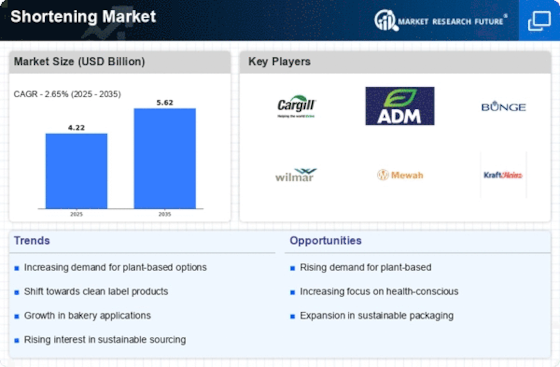Top Industry Leaders in the Shortening Market

Strategies Adopted by Shortening Key Players
Shortening Market is a crucial segment within the global food industry, playing a pivotal role in enhancing the texture, flavor, and shelf life of various food products. As consumer preferences evolve towards healthier alternatives and cleaner labels, the competitive landscape of the shortening market has witnessed significant shifts. This analysis explores the key players, strategies, market share factors, emerging companies, industry news, and current investment trends, providing a comprehensive overview of the competitive scenario.
Key Players:
Archer Daniels Midland Company (U.S.)
Bunge Limited (U.S.)
Cargill (U.S.)
Wilmar International Limited (Singapore)
AAK AB (Sweden)
There are some other players in this segment including:
Manildra Group (Australia)
International Foodstuff Company Holdings Limited (UAE)
ConAgra Brands (U.S.)
Associated British Foods (U.K.)
Ventura Foods, LLC (U.S.)
In response to changing consumer preferences and market dynamics, key players have adopted diverse strategies to maintain their competitive edge. The focus has shifted towards product innovation, with an emphasis on developing healthier and cleaner-label shortening options. Additionally, strategic collaborations and acquisitions have become commonplace, enabling companies to broaden their product portfolios and enhance their market reach. Cargill, for instance, has invested heavily in sustainable sourcing practices, aligning its strategy with the growing demand for ethically produced food ingredients.
Factors for Market Share Analysis:
Market share analysis in the shortening segment involves evaluating factors such as product portfolio diversity, geographic presence, production capacity, and customer relationships. Companies with a broad range of shortening products, catering to various applications in the food industry, tend to capture a larger market share. Additionally, a global footprint and efficient supply chain management contribute to market dominance. Customer loyalty and the ability to provide tailored solutions further solidify a company's position in this competitive landscape.
New and Emerging Companies:
The shortening market has seen the emergence of innovative startups that focus on niche segments, offering unique value propositions. Companies like AAK AB and Stratas Foods have gained prominence for their specialization in specialty fats and oils, catering to the growing demand for premium and gourmet food products. These newcomers bring agility and a fresh perspective to the market, challenging established players to adapt to evolving consumer trends.
Industry News:
Recent developments in the shortening market underscore the industry's commitment to sustainability and health-conscious choices. Several key players have announced initiatives to reduce the environmental impact of their operations, including the adoption of eco-friendly packaging and sourcing of sustainable raw materials. Such efforts resonate with the increasing consumer awareness and demand for ethically produced food products, prompting the industry to embrace responsible practices.
Current Company Investment Trends:
Investment trends in the shortening market reflect a strategic focus on technology and sustainability. Companies are investing in advanced production processes, including the implementation of automation and digitalization, to enhance efficiency and reduce operational costs. Moreover, investments in sustainable sourcing practices, such as palm oil certification programs, demonstrate a commitment to environmental responsibility. These trends align with the broader industry movement towards a more sustainable and transparent supply chain.
Overall Competitive Scenario:
The competitive scenario in the shortening market is dynamic, characterized by a delicate balance between established players, innovative newcomers, and the ever-evolving demands of consumers. As health and sustainability take center stage, companies that successfully navigate these trends will secure a competitive advantage. Product differentiation, strategic partnerships, and a keen understanding of regional preferences will be crucial in maintaining or gaining market share. The industry's ability to adapt to regulatory changes and consumer expectations will shape the competitive landscape in the coming years, making it imperative for players to stay agile and innovative in their approach.
Recent NewsTop of Form
Archer Daniels Midland (ADM):
Expanded their portfolio with an investment in a non-GMO sunflower oil processing facility, offering healthier alternatives to traditional shortenings.
Launched a new line of low-trans fat and palm oil-free shortenings catering to health-conscious consumers and ethical sourcing concerns.
Bunge Ltd.:
Partnered with a leading restaurant chain to develop a sustainable palm oil-free shortening for their fried food options, aligning with environmental responsibility trends.
Focused on improving the functionality and taste of their shortenings through research and development, aiming to provide better baking and frying performance.
Wilmar International Limited:
Increased their production capacity for coconut oil, a popular shortening option due to its perceived health benefits and versatility.
Invested in research on using waste from palm oil processing to produce sustainable bio-based shortenings, promoting environmental initiatives.
ConAgra Brands Inc.:
Introduced a new line of plant-based shortenings for baking and frying, aligning with the rising demand for meat alternatives and vegan options.
Focused on optimizing their existing shortening brands for specific baking and frying needs, offering targeted solutions for food manufacturers.











